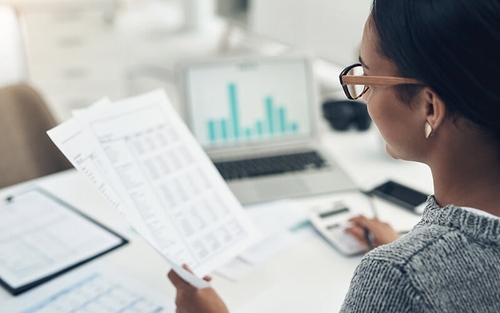How to prepare for an accounting interview: 7 Q&As


By The Schneider Guy
Estimated reading time: 3 minutes
To succeed as an accountant, you need to know accounting standards and how to apply them ethically to real-life situations. Hiring managers look for candidates who have strong technical skills, sound judgement and good collaborative abilities.
If you’re wondering how to prepare for an accounting interview, you’ve come to the right place. Here's a list of seven common interview questions for accountants, plus tips to help you craft your answers.
7 accounting job interview questions and answers
1. Tell me about a time you had to communicate difficult information to a leader, peer or customer. What was your approach?
The interviewer may ask this question to make sure you can deliver information in a thoughtful, clear and concise way.
Accountants often need to share results that do not meet expectations. It’s important to fully understand the facts and your audience to convey the message in the best manner.
How to answer:
- Give an example of a time you delivered difficult information to someone.
Describe how you adapted your communication style to suit the listener.
Talk about how you helped the person gain comfort with the outcome.
2. Provide an example of a situation where you had to prioritize your workload. How did you go about it?
In an accounting role, strict deadlines must be met to ensure a company’s financial accuracy and meet regulatory compliance. Accountants often juggle multiple time-sensitive tasks at one time.
By asking this question, the interviewer can gauge how well you work under pressure and your ability to meet deadlines.
How to answer:
- Explain what methods you used to prioritize your tasks.
Detail how you stuck to or altered the plan to meet deadlines.
Talk about how you kept your leader informed of your workload.
3. Walk me through a time you researched a new or emerging accounting issue. What was your process and what did you learn?
Accounting involves ever-changing guidance and novel scenarios. The interviewer wants to see how familiar you are with generally accepted accounting principles (GAAP) and your ability to navigate this new direction.
How to answer:
- Share a time you consulted authoritative guidance to find an answer to your question (GAAP, GAAS, IRS, IFRS, etc.).
Highlight how you applied the guidance to the problem at hand.
Mention what follow-up actions you took to use the guidance in future scenarios.
4. Describe a time you had a variance or an unexpected result. What did you do to resolve the issue?
Accountants face unexpected variances in reconciliations and when analyzing results. They must be able to work independently, think critically and solve problems to meet customer expectations.
How to answer:
- Talk about what resources and criteria you used to assess the data you found.
Discuss how you compared the data and results for reasonableness.
Showcase you understood the results and the ‘why’ behind them.
5. Has there been a time when you took on responsibilities outside your main job duties?
Many times, unexpected situations happen during the close process. The accounting manager may need an associate on their team to investigate an issue quickly. This question is designed to assess your ability to pivot and think on the fly.
How to answer:
- Provide an example of a time you were asked to dig into something you had little or no experience with.
Describe how you figured out what resources to use.
Explain how you completed the task and delivered the final product.
6. How do you maintain and expand your professional knowledge?
The certified public accountant (CPA) license has a continuing professional education (CPE) requirement. This is important, as there are constantly new standards coming out in the accounting field. The hiring manager wants to see how you stay on top of these developments.
If you don’t have experience as an accountant yet, think about how you gained professional knowledge while in school.
How To answer:
- Provide details about a new standard and how it affected your job/education.
Outline how you got up to speed on the new standard and learned to apply it.
Highlight any courses you took to expand your skill set.
7. How would you rate your Excel skills and ability to learn new systems?
Most accounting workpapers are in Excel. Being able to use and navigate Excel’s capabilities help streamline processes and increase accuracy.
Many accounting departments use other applications for specific processes as well. This question tests your ability to learn within Excel and new programs.
How to answer:
- Share any courses you may have taken in school or independently (including CPE courses).
Showcase your Excel skills (are you comfortable with pivot tables? Can you write macros?).
- Talk about any other applications you’ve learned to use in school or in previous jobs.
Make a lasting impression on the hiring team.
Now that you know what questions to prepare for, check out these steps to take before, during and after the interview to really showcase your full potential.

Schneider Guy loves the "Big Orange." He's passionate about the trucking industry and connecting people to rewarding careers within it. He's been the eyes and ears of our company since our founding in 1935, and he's excited to interact with prospective and current Schneider associates through "A Slice of Orange."



